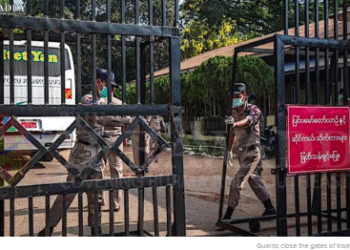YANGON: Myanmar’s gruelling civil war grinds on as euphoria over the stunning surprise offensive launched by opposition forces in October 2023 (Operation 1027) gives way to alarm at the State Administration Council’s (SAC) imposition of a military service law that could lead to widespread forced recruitment.
The SAC has so far managed to cling to power, even as it loses territory, bases and soldiers in battles with multiple armed opponents in the borderlands and increasingly on the plains of Rakhine, Karen, Karenni, Shan and Kachin states.
Overly optimistic analysis predicting imminent junta collapse persists, but it’s becoming less convincing.
It is irrefutable that an estimated 50 towns have fallen to the Three Brotherhood Alliance, Arakan Army and the Karen National Union, as well as other anti-junta forces. Yet no state capital or Myanmar military regional command centre has fallen.
There have been multiple cases of Myanmar soldiers fleeing into India, Bangladesh and Thailand to escape insurgent attacks. But even as its frontiers collapse, the SAC holds on in the centre, relying on air power and on strategic depth that protects its arms production.
Overly optimistic analysis predicting imminent junta collapse persists, but it’s becoming less convincing.
It is irrefutable that an estimated 50 towns have fallen to the Three Brotherhood Alliance, Arakan Army and the Karen National Union, as well as other anti-junta forces. Yet no state capital or Myanmar military regional command centre has fallen.
There have been multiple cases of Myanmar soldiers fleeing into India, Bangladesh and Thailand to escape insurgent attacks. But even as its frontiers collapse, the SAC holds on in the centre, relying on air power and on strategic depth that protects its arms production.
The Defence Services Industries (or Ka Pa Sa) continue to manufacture bombs, bullets, artillery rounds and other lethal materials, despite the massive amount of ordnance seized by the resistance.
The production zone and the transport network that sustains it, plus the system of hundreds of facilities and bases in central Myanmar, are formidable defences that so far appear stable, allowing the military to increase its punishing bombardments in multiple locations.
SURGE IN SAC AIR STRIKES
Myanmar conflict think tank Nyan Lynn Thit Analytica recently compiled stark analysis on SAC air strikes since the coup, and their surge following Operation 1027.
In 2021, there were 85 documented strikes, with 339 the following year. In 2023, there were 1,228 air strikes: Over a 122-day period between September to the end of December, the SAC conducted 750 air strikes, averaging six per day.
The analysis shows that casualties also rose, with 63 civilians killed and 42 wounded in 2021, jumping to 260 and 85 respectively in 2022, and increasing over the last year to 613 dead and 751 wounded.
The tempo of attacks has increased markedly, as has accuracy. In some cases, it is alleged that thermobaric weapons have been used, delivering greater payloads of destructive power.
The recent killing of more than 20 Rohingya Muslims in Minbya township of Rakhine, and the razing of towns in Hsihseng in Southern Shan State, underscore the destructive capacity of the SAC’s firepower, buttressed by widespread use of heavy artillery and increased use of weaponised drones.
In recent days, there have been multiple air strikes in four different states across Myanmar. According to an account from Karenni State, civilians were bombed 32 times in two hours.
Amnesty International reported in late January that several jet fuel sales to Myanmar’s military in 2023 were facilitated through storage facilities in Vietnam via Chinese and Liberian flagged tankers, but whose ownership could not be determined.
On Feb 1, Australia imposed sanctions on three Myanmar companies supplying the military with aviation fuel. US sanctions specifically targeting Myanmar’s foreign arms supplies have been imposed regularly since the coup, with specific sanctions on jet fuel supplies in March and August 2023.
These measures should be coordinated and expanded in light of the surge in air strikes.
David Scott Mathieson is an independent analyst working on conflict and human rights issues on Myanmar. This commentary first appeared on Lowy Institute’s blog, The Interpreter.
Source: channelnewsAsia






